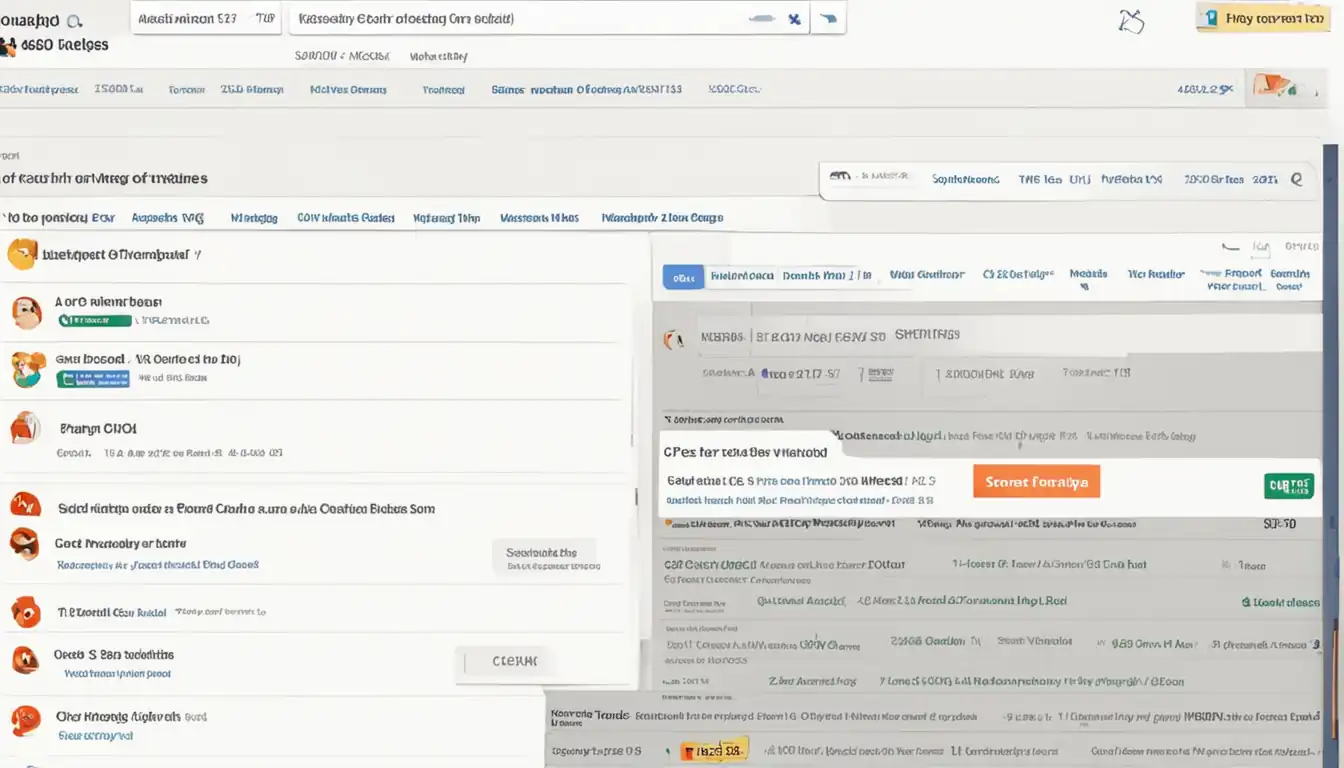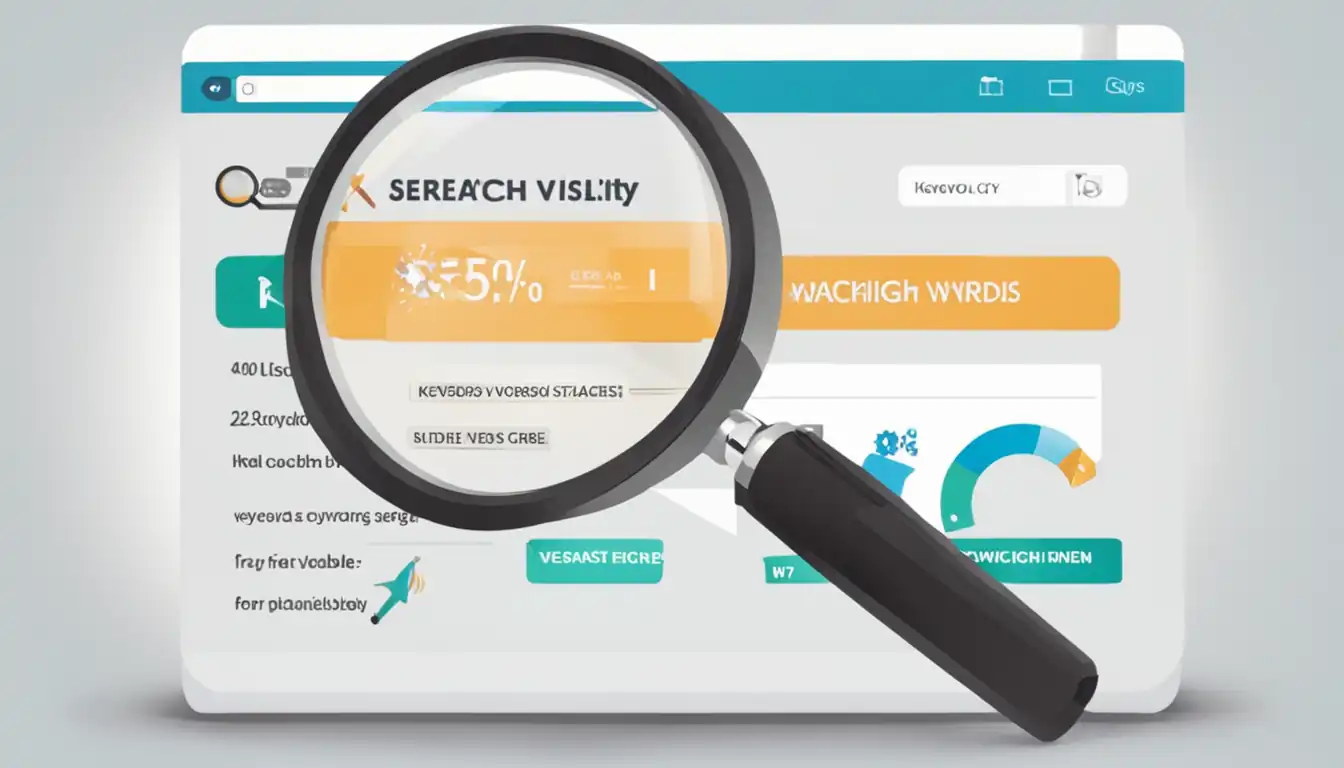Why Your Website Might Be Invisible on Search Engines and How to Fix It

If your website isn't showing up in search results, you might be feeling like it's disappeared into thin air. But fear not! There are reasons why this might be happening, and even better, there are steps you can take to fix it. In this post, we'll explore the mystery of the missing website and provide practical tips for improving your site's visibility on search engines.
The Mystery of the Missing Website: Understanding Search Visibility

Have you ever searched for your website on Google, only to find that it's nowhere to be found in the search results? It can be a frustrating and confusing experience, leaving you wondering what went wrong and how to fix it.
When your site is missing from search results, it means that it is not being indexed or ranked by search engines like Google, Bing, or Yahoo. This can happen for a variety of reasons, including technical issues, poor content, or even penalties from search engines.
Search engines play a crucial role in determining the visibility of your website. They use complex algorithms to crawl and index web pages, and then rank them based on relevance, authority, and other factors. If your site is not meeting the criteria set by search engines, it may be pushed down in the search results or even completely omitted.
Understanding the role of search engines in web visibility is essential for improving your site's search visibility and ensuring that it is easily discoverable by your target audience. In the next section, we'll explore some common reasons why websites go missing from search results and what you can do to address these issues.
Starting at Square One: Ensuring Your Site Is Indexed
When it comes to getting your website noticed by search engines, the first step is to ensure that it is properly indexed. This means that search engines have added your site to their database and are able to display it in search results.
The Indexing Process Explained
The indexing process begins when search engine bots, also known as crawlers or spiders, visit your website to analyze its content. These bots follow links from one page to another, gathering information about the content and structure of your site. Once the bots have collected this data, it is added to the search engine’s index, which is a massive database of web pages.
It’s important to note that simply having a website does not guarantee that it will be indexed by search engines. You need to take proactive steps to ensure that your site is visible to search engine bots and that its content is properly analyzed and added to the index.
Verifying Your Site’s Presence in Search Engine Indexes
After your site has been live for a while, it’s a good idea to verify that it has been indexed by major search engines such as Google, Bing, and Yahoo. You can do this by performing a simple search using the “site:” operator followed by your website’s URL. For example, to check if your site has been indexed by Google, you would enter “site:yourwebsite.com” into the search bar.
If your site does not appear in the search results, it may not have been indexed yet. In this case, you can take steps to submit your site to search engines and request that they crawl and index it. This can help ensure that your site is included in search results and can be found by potential visitors.
Common Culprits: Reasons Your Website Isn't Showing Up

Technical Glitches That Can Hide Your Site
When it comes to technical glitches, there are a few common issues that can prevent your website from showing up in search results. These can include:
Slow Loading Times: If your website takes too long to load, search engines may not prioritize it in their results.
Mobile Compatibility: With the majority of internet users now accessing websites on mobile devices, it's crucial that your site is optimized for mobile viewing.
Broken Links and Errors: Search engines may penalize your site if it contains broken links or other technical errors.
Content Issues That Affect Search Visibility
In addition to technical glitches, content issues can also impact your website's search visibility. Some common content-related culprits include:
Thin Content: If your website lacks substantial, valuable content, search engines may not see it as a reliable source of information.
Keyword Stuffing: Overloading your content with keywords can actually harm your search visibility, as search engines prioritize quality and relevance over keyword density.
Duplicate Content: Having duplicate content on your website can confuse search engines and lead to lower visibility in search results.
By addressing these technical and content-related issues, you can improve your website's search visibility and increase your chances of showing up in relevant search results.
The SEO Audit: Your First Step Towards Solving the Puzzle

When it comes to improving your website's search engine ranking, conducting an SEO audit is the crucial first step. This process involves evaluating your site's current performance, identifying areas for improvement, and creating a plan to address any issues. By taking the time to conduct a thorough SEO audit, you can set the stage for future success and ensure that your website is optimized for maximum visibility and traffic.
How to Conduct a Basic SEO Audit
Conducting a basic SEO audit doesn't have to be a daunting task. In fact, there are several simple steps you can take to get started. Here are some key components of a basic SEO audit:
Keyword Analysis: Start by evaluating the keywords that are currently driving traffic to your site. Are there any high-performing keywords that you could be targeting more effectively? Are there any new keywords you should consider incorporating into your content?
On-Page Optimization: Review the on-page elements of your website, such as title tags, meta descriptions, and headers. Are these elements optimized for your target keywords? Are there any opportunities to improve the relevance and visibility of your content?
Technical Analysis: Check for any technical issues that could be impacting your site's performance, such as broken links, slow page load times, or mobile-friendliness. Addressing these issues can have a significant impact on your site's search engine ranking.
Content Evaluation: Evaluate the quality and relevance of your website's content. Is it engaging, informative, and valuable to your target audience? Are there any opportunities to create new content or improve existing content to better align with your SEO goals?
Tools of the Trade: SEO Software That Can Help
Fortunately, there are many SEO tools available that can streamline the audit process and provide valuable insights into your website's performance. Some popular options include:
Google Search Console: This free tool from Google provides valuable data about your website's search performance, including keyword rankings, click-through rates, and technical issues.
Moz Pro: Moz offers a suite of SEO tools that can help you with everything from keyword research to link analysis. Their tools provide valuable insights into your website's performance and offer actionable recommendations for improvement.
SEMrush: SEMrush is another comprehensive SEO tool that offers features such as keyword tracking, site audits, and competitive analysis. It can help you identify opportunities for improvement and track your progress over time.
By leveraging these tools, you can gain a deeper understanding of your website's SEO performance and identify opportunities for improvement. Whether you're conducting a basic audit or diving into more advanced analysis, these tools can be invaluable resources for optimizing your website for search engines.
The Robots.txt File: Is It Blocking Your Content?
The Robots.txt file plays a crucial role in controlling how search engine bots crawl and index your website. It acts as a set of instructions for search engine crawlers, telling them which pages or files they should or shouldn't access.
Understanding the Role of Robots.txt
When used correctly, the Robots.txt file can help improve your site's SEO by preventing search engines from indexing certain pages, such as duplicate content or sensitive information. It can also be used to direct crawlers to specific areas of your site that you want to prioritize for indexing.
However, it's important to note that the Robots.txt file is not a foolproof method for keeping content private or hidden from the public. While it can prevent search engines from crawling certain pages, it doesn't guarantee that those pages won't be discovered through other means.
Common Mistakes with Robots.txt and How to Avoid Them
One common mistake with the Robots.txt file is blocking important pages or resources that you actually want to be indexed. This can happen if the file is not configured correctly or if there are errors in the syntax. It's important to regularly review and update your Robots.txt file to ensure that it's not inadvertently blocking valuable content.
Another mistake is using the Robots.txt file to hide sensitive information, such as login pages or private data. While this may prevent search engines from indexing these pages, it doesn't provide any real security. It's better to use other methods, such as password protection or noindex tags, to keep sensitive content secure.
In summary, the Robots.txt file can be a valuable tool for controlling how search engines crawl and index your site, but it's important to use it carefully and avoid common mistakes that could negatively impact your SEO efforts.
The Sitemap: Guiding Search Engines Through Your Site
A well-structured sitemap is crucial for guiding search engines through your site. It provides a clear map of your website's content and helps search engines understand the organization and hierarchy of your pages. This, in turn, can lead to better indexing and ranking of your site in search engine results pages (SERPs).
The Importance of a Well-Structured Sitemap
A well-structured sitemap not only helps search engines navigate and understand your site, but it also benefits your site visitors. It provides a user-friendly way to navigate through your content and can improve the overall user experience. Additionally, a well-structured sitemap can help identify any issues with your site's architecture, such as orphaned pages or pages with too many levels of hierarchy.
Creating and Submitting Your Sitemap Effectively
When creating your sitemap, it's important to ensure that it includes all relevant pages and follows the XML sitemap protocol. This means including important metadata for each URL, such as the last modified date and the priority of the page. Once your sitemap is created, it should be submitted to search engines through their respective webmaster tools. This ensures that search engines are aware of your sitemap and can use it to crawl and index your site effectively.
Remember, a well-structured sitemap is not only beneficial for search engines but also for your site visitors. It's an essential tool for improving the overall visibility and accessibility of your website.
Title Tags and Meta Descriptions: The Basics

When it comes to on-page SEO, optimizing your title tags and meta descriptions is crucial for search engine success. These elements are the first things that users see in search engine results, so they need to be compelling and relevant to the content on your page.
Title Tags: Your title tag is the clickable headline that appears in search engine results. It should accurately describe the content of the page and include relevant keywords. Keep it under 60 characters to ensure it displays properly in search results.
Meta Descriptions: The meta description is a brief summary of the page's content that appears below the title tag in search results. It should be around 150-160 characters and provide a clear and enticing overview of what the page is about.
Header Tags, Images, and Keywords: On-Page Elements That Matter
In addition to title tags and meta descriptions, optimizing header tags, images, and keywords is essential for on-page SEO success.
Header Tags: Proper use of header tags (H1, H2, H3, etc.) helps search engines understand the structure and hierarchy of your content. Use keywords naturally in your headers to signal the relevance of your content to search engines.
Images: Optimizing images with descriptive file names and alt text not only improves accessibility but also provides an opportunity to include relevant keywords for search engines to index.
Keywords: Strategically incorporating relevant keywords throughout your content is crucial for on-page SEO. However, it's important to use them naturally and avoid keyword stuffing, which can harm your search engine rankings.
Off-Page SEO: Building Authority and Trust
When it comes to off-page SEO, building authority and trust is crucial for improving search visibility. This involves strategies such as acquiring backlinks and leveraging social signals to enhance the website's reputation and credibility.
The Power of Backlinks in Search Visibility
Backlinks play a significant role in determining a website's authority and trustworthiness in the eyes of search engines. Quality backlinks from reputable websites can significantly improve a site's search visibility and organic traffic. It's important to focus on acquiring backlinks from relevant and authoritative sources to establish credibility and improve search rankings.
Social Signals and Their Impact on SEO
In addition to backlinks, social signals also play a role in off-page SEO. Engagement on social media platforms can contribute to a website's authority and trust, influencing its search visibility. Likes, shares, and comments on social media posts can indicate the relevance and popularity of a website, which can positively impact its SEO performance.
By incorporating both backlinks and social signals into off-page SEO strategies, businesses can effectively build authority and trust, ultimately improving their search visibility and driving organic traffic to their website.
Mobile-Friendliness: A Non-Negotiable for Modern SEO

In today's digital landscape, mobile-friendliness is no longer just a nice-to-have feature for websites—it's a non-negotiable for modern SEO. With the majority of internet users accessing content on their mobile devices, search engines have prioritized mobile-friendly websites in their rankings. This means that if your site is not optimized for mobile, you could be missing out on valuable organic traffic.
How Mobile Usability Affects Search Rankings
Google, the dominant search engine, has made it clear that mobile usability is a key factor in determining search rankings. Websites that provide a seamless and responsive experience across all devices are more likely to rank higher in search results. This is because Google wants to ensure that users have a positive experience when accessing content, and mobile-friendliness is a significant part of that experience.
Testing and Improving Your Site’s Mobile Experience
To ensure that your website is meeting the mobile-friendliness standards set by search engines, it's crucial to test and improve your site's mobile experience. This can be done through various tools and techniques, such as:
- Using Google's Mobile-Friendly Test to identify any issues with your site's mobile usability
- Implementing responsive design to ensure that your site adapts to different screen sizes
- Optimizing images and content for faster load times on mobile devices
- Checking for any mobile-specific errors in Google Search Console
By prioritizing mobile-friendliness and continuously testing and improving your site's mobile experience, you can boost your search rankings and provide a better overall user experience for your audience.
Page Speed: Don’t Let a Slow Site Drag You Down
In the world of SEO, page speed is a crucial factor that can make or break your website's performance. A slow-loading site can not only frustrate visitors but also have a negative impact on your search rankings. Search engines like Google prioritize user experience, and a slow site can lead to a higher bounce rate, lower dwell time, and ultimately, a drop in rankings.
The Impact of Load Times on Search Rankings
The connection between page speed and search rankings is clear: faster-loading sites tend to rank higher in search engine results. This is because search engines want to deliver the best possible experience to their users, and a slow site simply doesn't meet that criteria. In fact, Google has explicitly stated that page speed is a ranking factor, so it's not something to be taken lightly.
Tips and Tools for Speeding Up Your Website
So, what can you do to improve your website's page speed? Here are some tips and tools to help you get started:
- Optimize Images: Large image files can slow down your site, so be sure to compress and optimize your images for the web.
- Minimize HTTP Requests: Reduce the number of elements on your page, such as scripts, stylesheets, and images, to minimize the number of HTTP requests.
- Enable Browser Caching: This allows your site to store data in a visitor's browser, so they don't have to wait for the entire page to load every time they visit.
- Use a Content Delivery Network (CDN): A CDN can distribute your site's static files across multiple servers around the world, reducing the distance between the user and the server and speeding up load times.
By implementing these tips and using tools like Google's PageSpeed Insights and GTmetrix, you can identify areas for improvement and take action to speed up your website. Don't let a slow site drag you down in the search rankings—take the necessary steps to optimize your page speed and improve your overall SEO performance.
Google Penalties: Identifying and Recovering from Them

When it comes to SEO, Google penalties can be a nightmare for website owners. These penalties can significantly impact your site's visibility and traffic, making it crucial to identify and recover from them as quickly as possible.
Signs That Your Site Might Be Penalized
There are several signs that your site might be penalized by Google. These can include a sudden drop in organic traffic, a decrease in search engine rankings, or a notification from Google in your Search Console account. Additionally, if your site has been engaging in any black hat SEO tactics, such as keyword stuffing or buying backlinks, it's likely that you may be penalized by Google.
Steps to Recover from a Google Penalty
Recovering from a Google penalty can be a complex and time-consuming process, but it's essential for the long-term success of your website. Here are some steps to take in order to recover from a Google penalty:
Identify the Penalty: The first step in recovering from a Google penalty is to identify the specific penalty that has been applied to your site. This can be done by checking your Google Search Console account for any notifications or manual actions.
Address the Issue: Once you have identified the penalty, it's important to address the issue that caused the penalty in the first place. This may involve removing any low-quality or spammy content from your site, disavowing any toxic backlinks, or fixing any technical issues that may have triggered the penalty.
Submit a Reconsideration Request: If your site has been penalized manually by Google, you will need to submit a reconsideration request once you have addressed the issue. This request should outline the steps you have taken to rectify the problem and demonstrate your commitment to following Google's Webmaster Guidelines in the future.
Focus on Quality: Moving forward, it's essential to focus on creating high-quality, valuable content for your website and building natural, authoritative backlinks. By following best practices and avoiding any black hat SEO tactics, you can help prevent future penalties and improve your site's overall performance.
Recovering from a Google penalty can be a challenging process, but by taking the necessary steps and focusing on quality, you can restore your site's visibility and rankings in the long run.
Local SEO: Ensuring Your Local Business Gets Found
Local SEO is crucial for brick-and-mortar businesses looking to attract customers in their local area. With the majority of consumers turning to the internet to find local businesses, it's essential to ensure that your business can be easily found in local search results.
The Importance of Local Search for Brick-and-Mortar Businesses
Local search is a powerful tool for brick-and-mortar businesses, as it allows them to reach potential customers in their immediate vicinity. When consumers search for products or services "near me," businesses that have optimized their online presence for local search are more likely to appear in the search results. This can lead to increased foot traffic, phone calls, and ultimately, sales for local businesses.
Optimizing Your Site for Local Search Results

To ensure that your business is visible in local search results, it's important to optimize your website for local SEO. This includes:
- Creating a Google My Business listing: This is a crucial step for local businesses, as it ensures that your business information appears in Google's local search results and Google Maps.
- Using local keywords: Incorporating local keywords into your website content can help improve your visibility in local search results.
- Obtaining local backlinks: Building backlinks from local websites and directories can signal to search engines that your business is relevant to a specific geographic area.
By implementing these strategies, you can improve your business's visibility in local search results and attract more local customers.
When it comes to boosting your site’s visibility, blogging plays a crucial role in engaging and retaining your audience. Crafting content that resonates with both readers and search engines is essential for driving traffic to your site and keeping visitors coming back for more.
Crafting Content That Resonates with Readers and Search Engines
Creating high-quality, relevant content is key to capturing the attention of your target audience. By understanding the needs and interests of your readers, you can tailor your content to address their pain points and provide valuable solutions. Additionally, optimizing your content for search engines through strategic keyword placement and relevant meta tags can help improve your site’s visibility and ranking.
The Role of Blogging in Boosting Your Site’s Visibility
Blogging allows you to consistently publish fresh, engaging content that keeps your audience informed and entertained. By regularly updating your blog with valuable information, you can establish your site as a reliable source of industry knowledge and attract a loyal following. Furthermore, search engines favor websites that frequently update their content, making blogging an effective strategy for improving your site’s visibility and search engine ranking.
Monitoring Your Progress: Tracking Search Rankings Over Time
When it comes to improving your SEO, monitoring your progress is essential. One of the key aspects of monitoring is tracking your search rankings over time. This allows you to see how your efforts are paying off and identify areas for improvement.
Setting Up the Right Tools for Rank Tracking
To effectively track your search rankings, you need to have the right tools in place. There are many tools available for rank tracking, ranging from free options to more advanced paid tools. It's important to choose a tool that provides accurate and up-to-date data, as well as the ability to track your rankings over time. Some popular options include SEMrush, Ahrefs, and Moz.
Once you have chosen a rank tracking tool, you will need to set it up to monitor your website's search rankings. This typically involves entering your website's URL and selecting the keywords you want to track. It's important to choose relevant keywords that are important to your business and have a decent search volume.
Interpreting Data and Making Informed Decisions
Once you have started tracking your search rankings, it's important to be able to interpret the data and make informed decisions based on the results. Look for trends over time, such as increases or decreases in rankings, and try to identify any patterns or correlations with your SEO efforts.
If you notice that certain keywords are consistently performing well, you may want to focus more of your SEO efforts on optimizing for those keywords. On the other hand, if you see a decline in rankings for certain keywords, it may be time to re-evaluate your SEO strategy for those terms.
By regularly monitoring and interpreting your search ranking data, you can make informed decisions about your SEO strategy and continually improve your website's performance in search results.
When to Call in the Pros: Hiring an SEO Expert

Hiring an SEO expert can be a game-changer for your business, but how do you know when it's time to bring in the professionals? Here are some signs that you might need professional SEO help:
Stagnant or Declining Traffic: If your website's traffic has plateaued or even decreased, it could be a sign that your current SEO efforts are not working as they should.
Lack of Internal Resources: Small businesses and startups often lack the internal resources to dedicate to SEO. If you don't have the time or expertise to handle SEO in-house, it might be time to outsource to a professional.
Algorithm Changes: Search engine algorithms are constantly evolving, and keeping up with these changes can be a full-time job. If you're struggling to stay on top of algorithm updates, it might be time to bring in an expert who can navigate these changes for you.
Low Conversion Rates: High traffic is great, but if those visitors aren't converting into customers, it's time to reevaluate your SEO strategy. An SEO expert can help optimize your site for better conversion rates.
Penalties or Manual Actions: If your site has been hit with a Google penalty or manual action, it's crucial to address the issue quickly and effectively. An SEO expert can help you navigate the process of recovering from these setbacks.
When it comes to choosing the right SEO agency or consultant, there are a few key factors to consider:
Experience and Track Record: Look for an agency or consultant with a proven track record of success in the SEO industry. Ask for case studies and client references to gauge their level of expertise.
Transparency and Communication: A good SEO expert will be transparent about their methods and communicate clearly with you about the work they're doing. Avoid agencies that are secretive or unwilling to explain their strategies.
Customized Strategies: Every business is unique, and a one-size-fits-all approach to SEO won't cut it. Look for an agency or consultant that takes the time to understand your business and develop a customized strategy to meet your specific goals.
Ethical Practices: Beware of agencies that promise quick results through shady tactics like buying links or keyword stuffing. Look for an SEO expert who follows ethical and sustainable practices that will benefit your business in the long run.
By keeping these factors in mind, you can make an informed decision when it comes to hiring an SEO expert for your business.
The ever-changing landscape of SEO
In the fast-paced world of digital marketing, staying ahead of the game is crucial for success. This is especially true in the realm of search engine optimization (SEO), where trends and best practices are constantly evolving. To remain competitive, it's essential for businesses and marketers to continuously adapt and learn in order to keep up with the latest SEO trends.
Continuous learning and adaptation in SEO strategy
One of the key components of staying ahead in SEO is the commitment to continuous learning and adaptation. This means staying informed about the latest algorithm updates, changes in consumer behavior, and emerging technologies that impact search engine rankings. By staying proactive and adaptable, businesses can ensure that their SEO strategies remain effective and relevant in the ever-changing digital landscape.
In conclusion, staying ahead of the game in SEO requires a proactive approach to continuous learning and adaptation. By staying informed and adaptable, businesses can position themselves for success in the competitive world of digital marketing.
Final Thoughts: Patience and Persistence in SEO

When it comes to achieving success in SEO, it's important to remember that it's not a sprint, but a marathon. The timeline for SEO success can vary depending on a multitude of factors, including the competitiveness of your industry, the quality of your content, and the strength of your backlink profile. Patience is key when it comes to SEO, as it can take months or even years to see significant results.
It's crucial to keep your eye on the prize and focus on long-term SEO goals. While it can be tempting to chase quick wins and immediate results, the reality is that sustainable, long-term success in SEO requires a persistent and strategic approach. By consistently creating high-quality content, building authoritative backlinks, and optimizing your website for search engines, you can set yourself up for long-term success in the ever-evolving world of SEO.
Conclusion
Improving your website's visibility on search engines is a process that requires patience and persistence. By understanding the factors that can affect your site's search rankings and taking proactive steps to address them, you can set yourself up for long-term SEO success. Remember, staying ahead of the game and continuously adapting your SEO strategy will be key to achieving your goals. With the right approach and a little bit of time, your website can rise to the top of the search results and attract the attention it deserves.